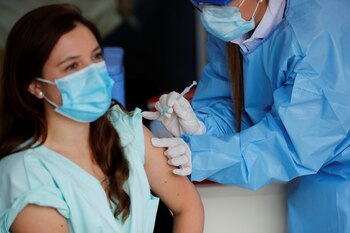
The Director of Promotion and Prevention of the Ministry of Health, Gerson Bermont, expressed his concern about the low rates of vaccination against Covid-19 that have occurred over the last week in the country.
The official called the attention of local and departmental authorities to start creating strategies that will motivate and invite the Colombian population to be vaccinated against Covid-19 with the first, second and third booster doses.
Bermont stressed that “the fall in vaccination should attract the attention of all actors, since last week 807 thousand doses were applied, which reveals a sustained drop.”
He added: “This is of great concern, because this implies that many IPS are shutting down vaccination teams, simply because of the low application. Today is the time for extramural strategies, to have teams door to door, sidewalk by sidewalk, corregimiento by corregimiento”.
The official said that if people do not reach the vaccination points, the vaccination points must reach citizens. In addition, he pointed out that “the difficulty we have is that people are not reaching the points and therefore we close them, but when there are strategies coming out, the population is found”.
He also referred to the progress of the National Vaccination Plan against Covid-19 and highlighted that 82% of the population has been reached with at least one dose and, in general, in terms of second and booster doses, there is still a lag, which is the challenge currently facing the country. “This lag between first and second doses should not happen,” he noted.
Regarding the first or single doses, he reported that 82 per cent were reached, second or single doses were reached with 67.2 per cent and that 34.9 per cent of the population older than 18 years old had booster doses.
Bermont argued that strategies should be strengthened to overcome this gap, which occurs especially among children and young people in the country. “The advantage is that our population over 30 is in good progress.”
As for the status of progress in complete schemes, 67.2 per cent of the population has been reached, while reinforcements have been applied to more than 9.7 million citizens.
Likewise, he said that “we must have sustained immunity, with booster doses.” He also clarified that, “although 9.7 million is important, this must be almost 100% of those who complete the schemes.”
Currently, in the country's daily Covid-19 report that makes the health portfolio, it has started to range from 25 to 35 deaths a day, which has not been recorded since the end of last semester, more specifically in October, which is a reflection of the overcoming of the omicron peak, which has led to maintaining this solid trend towards decline.
It is noteworthy that María Belén Jaimes, coordinator of the Public Health Surveillance Group of the Directorate of Epidemiology and Demography of Minsalud, reiterated that in recent weeks there has been a much more decreasing trend in mortality from Covid-19 and cases, even in priority groups.
“This decline in mortality, which has reached very low levels, is a consequence of the high vaccination coverage that has been achieved, the progress in reinforcements, the vaccination of children and adolescents, but also of the high seroprevalence achieved in capital cities. It is consistent across the country and shows a very positive picture that should fill us with hope,” Jaimes explained.
Finally, with regard to the death curve by age group, according to the entity, mortality has occurred in older adults and has a very important proportion in people aged 70, 80 and over.
Keep reading:
Últimas Noticias
Debanhi Escobar: they secured the motel where she was found lifeless in a cistern

The oldest person in the world died at the age of 119

Macabre find in CDMX: they left a body bagged and tied in a taxi
The eagles of America will face Manchester City in a duel of legends. Here are the details

Why is it good to bring dogs out to know the world when they are puppies



